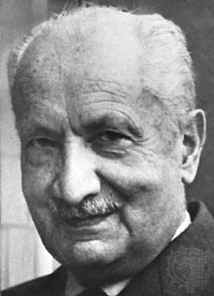Heidegger on Technology
For a long time I've wanted to read Martin Heidegger's essay "The Question Concerning Technology" as its topic concerns my thesis. I spent the greater part of today plowing through its nineteen pages, plus footnotes. It's not an easy text; he uses lots of original terms (which have been translated from the German). But it was worth the effort.
What follows is the shortest possible summary of this essay that I can make.
For Heidegger, truth is unveiling or revealing, in ways that are beyond mere knowledge, because human beings are more than mere knowers. We love, have goals, desires and personalities. Modern technology poses a problem because it views the world as a pure resource. The difference, he cites, between a windmill and a hydroelectric power plant -- the difference between technology and modern technology -- is that in the former there was greater harmonious relationship with nature, while in the latter, nature is seen as an object to be exploited, in which other principles such as gaining "the maximum yield at minimum expense" predominate. Furthermore, the problem with modern technology is that it requires us to view the whole world in this way, as a "calculable coherence of forces", and excludes other forms of revealing. He calls this mentality "enframing", that which calls out, impels, and challenges forth the revealing of the actual. While it's true that all objects in the world have the aspect of being resources, of being objects of scientific analysis, there are poetic, religious and aesthetic modes of revealing truth as well.
Heidegger does not see danger in technological inventions per se, but only if they prevent us from experiencing the other forms of revealing. In his conception, a fullness of human consciousness results from allowing nature to more fully reveal itself, that is, in greater variety. We can resist the overwhelming power of modern technology to reduce our worldview by recovering the sensibilities of the craftsman or artisan or poet, which, he holds, was the pinnacle of ancient Greek culture. Just as nature allows a tree to come out of a plant, the artist brings a pot out of clay, or a song out of silence, and his or her sense of wonder and respect for the object is retained. In this way we have a harmonious relationship with nature, rather than one that merely seeks to corral and consume its energy. This "saving power" regarding technology lies in our ability to listen, reflect and witness.
Food for thought.
P.S. This past weekend I also posted on maternal prayer-leading, called Theology in 15 Seconds at the Jesuit blog, Ibo et Non Redibo.
P.S. This past weekend I also posted on maternal prayer-leading, called Theology in 15 Seconds at the Jesuit blog, Ibo et Non Redibo.




Hi John,
ReplyDeleteJust came around to reading this post. For a while there, I thought you weren't going to mention "enframing"(gestell) until I found it in the middle paragraph(The other big concept is of course "Standing Reserve"( bestand).
Anyway, I remembered that collection of essays which has another interesting essay on technology by Heidegger. I believe it can be found in "On Time and Being" (NOT Being and Time)
Regards,
VQ
Hi VQ thanks for the pointer about the other essay by M.H. I'll look into it right away.
Delete-John